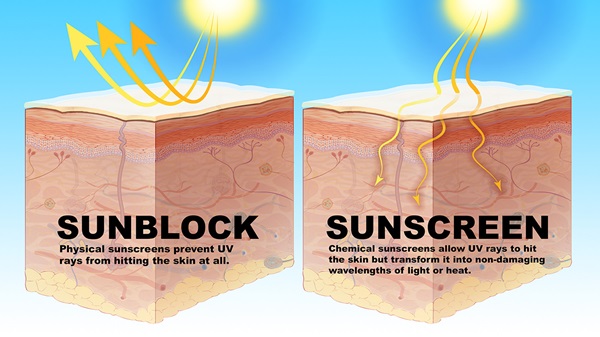Are you overwhelmed by the many different products available to reduce sun exposure? What works best to prevent skin cancer and why? Basically, there are three types of products: sunscreen, sunblock, or a combination of the two.
What’s the difference between sunscreen and sunblock?
“Sunscreen is like a filter; it allows a certain amount of sunlight through, so it doesn’t provide as much protection as sunblock,” says Intermountain Riverton Hospital dermatologist Dylan Alston, DO. “Sunscreens often contain ingredients that can sting the eyes and cause allergic reactions or acne breakouts.”
“Sunblock is a physical blocker and reflects sunlight off the skin. Broad-spectrum sunblock that contains zinc oxide and/or titanium dioxide is most effective because it works on both types of ultra violet rays — UVA and UVB. The new sunblocks are invisible and aren’t like the old zinc oxide products that remained white after application,” says Dr. Alston.
Some products are both a sunscreen and a sunblock. To help prevent skin cancer, Dr. Alston recommends using a product with an SPF of 30 or higher, which will protect your skin 30 times longer than wearing no sunblock. Choose a product that won’t irritate your skin, and reapply often, especially if you’re in the water or sweating a lot.
One in five Americans will develop skin cancer in their lifetime
According to the American Cancer Society, skin cancer is the most common cancer in the U.S., one in five Americans will develop skin cancer in their lifetime.
MORE INFORMATION: http://melanomafoundation.org/prevention/facts.htm
Is skin cancer usually caused by overexposure to sun?
The U.S. Environmental Protection Agency estimates that the sun causes 90 percent of all non-melanoma skin cancers, and other research links it to 65 percent of all melanomas.
RELATED: 9 Tips to Prevent Skin Cancer
Does a bad sunburn in childhood increase your risk of skin cancer?
The U.S. Skin Cancer Foundation reports that intermittent, intense ultra-violet ray exposure is believed to be more closely associated with melanoma than chronic sun exposure. Additionally, one blistering sunburn during childhood or adolescence doubles the risk of melanoma later in life, and five sunburns by any age doubles the risk as well.
Who is most at risk for skin cancer?
- Fair-skinned individuals who sunburn easily
- People with many moles or any large, atypical moles
- Those who live within 45 degrees north or south of the equator. This includes people in Salt Lake City, Utah, which has a latitude of 40.06º north
- Those with a family history of melanoma
What medications increase your risk of sunburn?
- Antibiotics such as tetracycline, doxycycline, and ciprofloxacin
- Ibuprofen and other non-steroidal anti-inflammatories
- Retinoids such as accutane that treat severe acne
- Diuretics such as furosemide, which is used to treat high blood pressure, swelling, etc.
What diseases make people more susceptible to sunburn?
- Auto-immune diseases such as lupus erythematosus
- Skin diseases such as psoriasis, rosacea, and dermatomyositis
How do you know if you might have skin cancer?
If you notice changes in moles, sores, bumps, or patches on your skin, see a dermatologist, who can help identify whether it’s a skin condition or a type of skin cancer, such as the more common basal cell or squamous cell carcinoma or the more deadly melanoma.
